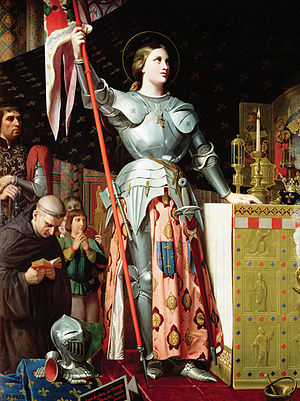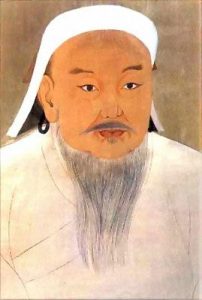Imagine yourself as a child, and imagine being able to hear the voices of the divine, the voices of angels such as Michael the Archangel. Imagine that every time you heard these voices you would see a bright light and you would feel a sense of security. Now imagine that your country had been invaded by those you had been at war with, and these voices came to you and tasked you with the mission to drive that enemy from your land. That was what life was like for young Joan of Arc. She heard the voices of the divine and accepted the challenge to drive out the English from France and to restore her country to what it once was. It was in 1429 when France came face to face with Joan, a young girl, just seventeen years old claiming to hear the voices of angels. Even so, the French knew of her coming because it had been prophesied before she was born, that “France would be ruined by a woman and restored by a virgin from the oak forest of Lorraine.”1

Joan of Arc, born around January of 1412, claimed early in her life that she was divinely inspired to help her country of France in the wake of the political and military turmoil facing her land. When she was in her early teens, she had witnessed a light, soon followed by voices that would speak to Joan with mild commands, “Be good” and “Go to church often.” She had said it was St. Michael who had spoken to her, but he was also accompanied by many angels as well, one of which was St. Gabriel. As she continued to listen to the voices of the divine, she came to realize her purpose, and that purpose was to save her people of France from their enemies. It was 1429 when Joan of Arc heard the voices telling her that it was time to begin her mission, the mission that they had been preparing her for.2
The Hundred Years’ War was a war between the two kingdoms of England and France. It lasted actually for 116 years, beginning in May 1337, and lasting until 1453. The war began when King Edward III of England, the grandson of French monarch Philip IV the Fair, claimed the French throne when the French king Charles IV died without a male heir to the throne.3 Throughout the war, the English had dominated and overpowered France, winning significant battles, such as the Battle of Crecy, the Battle of Agincourt, and the Battle of Poitiers. It was because of these battles and many other victories for England that many believed that the ultimate winner would be the English, and because most of the battles were fought on French territory, France was faced with a destroyed and battered country.

Even so, Joan of Arc was afraid at the enormity of what God was asking her to do. Yet she met His commands with determination and vigor. Joan dressed in male armor and cut her hair as a fallback so that none would be able to tell she was a woman and deny her the opportunity to fight and carry out her mission in the war. With this she took up the sword gifted to her by the angels and began her trek to meet the Dauphin, the yet-to-be-crowned King Charles. Once she came face to face with the Dauphin Charles, Joan of Arc was not immediately recognized as a leader, but she had told the Dauphin that she was sent to him by the voices of God to drive away the English soldiers. Ultimately, she convinced him to let her join the war. The Dauphin soon sent Joan to the Siege of Orleans (October 1428-May 1429).When she arrived, she raised the morale of the troops, allowing the French soldiers to break the siege only nine days later. Soon after, Joan and the French troops went on to take over several English strongholds, and because of the break in the siege and the victories afterward, it allowed the Dauphin Charles VII to march to Reims for his coronation. The siege was the first major victory for the French and the first victory for Joan as well. After the Siege of Orleans, Joan was recognized by King Charles VII as a leader. Joan went on to lead more troops, gaining more victories for France, finally turning the tide of the war.4

That all came to an end, however, when Joan of Arc was captured at Compiegne in May 1430. Upon her capture by English forces, Joan was accused of heresy and witchcraft. On January 9, 1431, her heresy trials began. Joan of Arc had six public examinations and nine private examinations in total. At the end of the trial, the judges composed The Twelve Articles of Accusation, which were the charges accusing her of hearing the voices of the divine and of dressing in men’s clothing, all confirmed by Joan of Arc herself. At the end of the trial, the church’s officials agreed that Joan’s actions and words were evil. They began their final sentence, and Joan agreed to obey all of the rulings made by the Church. She was welcomed back into the Church, but condemned to solitary penance in prison, so she could never commit another crime again. Despite agreeing to begin wearing female clothing again, four days after her sentence, Joan of Arc was seen in prison wearing male clothing, defying the agreed terms of the Church. Soon Bishop Cauchon and seven judges went to Joan of Arc’s cell and questioned her over her wearing men’s clothing. Upon arriving, the Bishop asked why she began wearing men’s clothing again, and she stated, “I had done this on my own free will. Nobody has forced me; I prefer the apparel of a man to that of a woman.”5 When asked why she had done this, she stated that it was more proper to wear men’s clothing than women’s because she was surrounded by men. She also stated that in her time spent in the prison she had been molested by the English when she was wearing women’s attire. The Bishop then asked if she had been hearing the voices of saints again, and when she answered yes, he asked about what they had told her. Joan of Arc had told the Bishop Cauchon that she had endangered her soul by recanting and that she was being condemned because she was trying to save her life. Joan also told him that if God did not want her to recant then she would listen to His word. With this the Bishop stated that she was a “relapsed heretic,” and that the church would have to take legal measures by proceeding “according to law and reason.”6 Joan was charged with relapsing into heresy on May 28,1431, because Joan of Arc had ignored the Church and admitted to hearing the voices of saints and started re-wearing men’s clothing. She was then sentenced to death, to be burned at the stake two days later, on May 30.7

During and after Joan of Arc’s trial, the French forces became timid and soft, but ultimately won the war in 1453. After the war, King Charles VII ordered a review of Joan of Arc’s trial, even though the Roman Catholic Church did not formally begin the canonization process till 1869 and even then was not declared a saint for another fifty years.8 France celebrated and recognized Joan as a national hero because Joan of Arc fulfilled the prophecy that was foretold, listened to the premonitions she received from God, and never strayed from her beliefs. The French believe she was a key factor in the war because she came to France’s aid when they were at their breaking point. Joan of Arc broke the Siege of Orleans and pushed the English back, allowing France to reclaim what they had lost. She is a hero not only of France, but she is a representation of courage and independence and to this day continue to celebrate her life and her legacy.9
- Soren Bie, “Prophecies,” Joan of Arc (Jeanne D’Arc) 1412 – 1431, 9 July 2017, www.jeanne-darc.info/biography/prophecies/. ↵
- Kathryn Harrison, Joan Of Arc: A Life Transfigured (New York: Doubleday, 2014) 1, 17-20. ↵
- World History Encyclopedia, 2011, s.v. “The Hundred Years’ War,” by Alfred J. Andrea. ↵
- Julien Thery “How Joan of Arc Turned the Tide in the Hundred Years’ War,” National Geographic, April 13, 2017, https://www.nationalgeographic.com/archaeology-and-history/magazine/2017/03-04/joan-of-arc-warrior-heretic-saint-martyr/. ↵
- Julien Thery, “How Joan of Arc Turned the Tide in the Hundred Years’ War,” National Geographic, April 13, 2017, https://www.nationalgeographic.com/archaeology-and-history/magazine/2017/03-04/joan-of-arc-warrior-heretic-saint-martyr/. ↵
- Julien Thery “How Joan of Arc Turned the Tide in the Hundred Years’ War,” National Geographic, April 13, 2017, https://www.nationalgeographic.com/archaeology-and-history/magazine/2017/03-04/joan-of-arc-warrior-heretic-saint-martyr/. ↵
- Craig Taylor, Joan of Arc: La Pucelle (New York: Manchester University Press, 2006), 205, 207, 216, 220, 222. ↵
- Mary Gordon, Joan of Arc (New York: Lipper/Viking, 2000), 166. ↵
- Julien Thery “How Joan of Arc Turned the Tide in the Hundred Years’ War,” National Geographic, April 13, 2017, https://www.nationalgeographic.com/archaeology-and-history/magazine/2017/03-04/joan-of-arc-warrior-heretic-saint-martyr/. ↵



40 comments
Pamela D. Hayes, Esq
I can remember the first time I heard the name st Joan of Arc. I was ten years old. preparing for confirmation. Immediately I began to look into her life. For me that included reading books and a promise to visit France and Rouen which I have done on several occasions. I look forward to the 600 anniversary in Rouen in 2031. Viva Jeanne d’Arc. I hope I can bust Orlean and Lorraine.
Daniela Iniguez-Jaco
Incredible article, I enjoyed reading it! Before reading this article I already knew about Joan d’Arc and knew what she was known for however I was not fully of aware of everything. I really love how she was a female leader during this time even though female leaders were not permitted she still continued and did not care. I always wondered why the men immediately believed she was a witch, they couldn’t have thought that she was just a strong woman who did not care about what men said, I think her death will always impact women because she was one of the first female rolemodels.
Reagan Clark
We have all heard about Joan of Arc before. Almost every student learns about her at some point. While we learn about her, they never go farther that saying she was a girl who helped the war and was executed for it. This article provides the background information about what happened to her after she got captured. I like that the article included this information because it showed that Joan of Arc stayed true to herself while imprisoned. While I love the Joan of Arc story, I can see why everybody thought she was a heretic. If someone were walking around right now saying that they heard the voices of saints and angels, everyone would think that they are off-the-rails crazy. I am glad that she was able to play such a pivotal role to end the war to begin with.
Kimberly Parker
I remember reading and learning about Joan of Arc in my history class in High School and learning about how she was deemed a heroine of France due to her role during the Lancastrian phase of the Hundred Years’ War. She was so brave and courageous, a true inspiration to women then and now. This article does a great job of depicting her in such a role and explaining her life in great detail as well.
Amelia Hew
To be honest, it’s hard to imagine that a person was able to hear the voices of the divine. Even if it’s true that Joan was able to hear the voices, it led her country to victory, however it ultimately costed her life and was burned on a stake. As a woman, she has shown great leadership that surpasses men of her time. It’s a shame that her life ended at such a young age, if she was not burned on the stake, perhaps she would have left behind more fascinating legends and stories about her life.
Analisa Cervantes
St. Joan of Arc has always been an inspiration to me. She was very brave and courageous in a time were women were seen as nothing more than housewives. I find her story and life to be very unique. She was willing to lead an army to defend her country at the eventual cost of her life. She is a leader among us all.
Vania Gonzalez
I had never read up on Joan of Arc or knew her story but everyone knows who she is so this article was quite interesting to me because it provided a quick backstory to her. She believed in God and followed Him until the end always obeying and that really makes you believe that he is real.
Malleigh Ebel
I have always been inspired by Joan of Arc’s spirit, but I did not know how her trial went in such detail! The church imprisoned a strong military leader for little more than being a woman. She claimed to be sent by God and made many victories for France, yet the church of all people called her a heretic. I did not know that she began wearing men’s clothing because she was molested and told by God the church was corrupt: and she told Bishop Cauchon to his face! she was a striking young woman who was a victim of the churches corruption, but stayed rigid on her beliefs. I also enjoy how this article shows the difference between God and the Catholic Church: Joan of Arc was doing God’s will, while the church inhibited it: which happens once in a while. The church’s will does not always mean God’s will.
Emmanuel Ewuzie
This story is a testament to the importance and significant impact a strong leader can have. Because of Joan Of Arc’s great leadership, the tide of war changed and France gained not only momentum but also hope. Her successful stretch of war victories must have truly be written in the stars. A woman leading an army in 1400s is an extremely rare occurrence and unheard of for that time period.
Noah Wesolowski
It’s tragic that Joan of Arc was burned alive after living such an adventurous life and saving her home country from losing a war. Not only did she join the army when she was young she was also able to turn the tide of the war and help France ultimately win it. She followed the voice of God she heard in her head and it led her to victory but also to death.